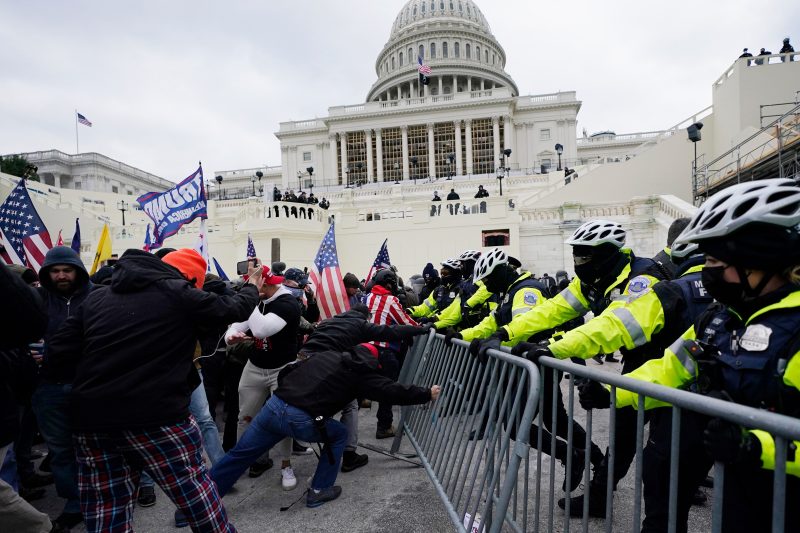U.S. District Judge Trevor N. McFadden has sentenced 30 defendants for their role in the Jan. 6, 2021, riot at the Capitol. As Geoffrey Sills, 31, of Virginia stood before him Tuesday, McFadden said, “Of all the January 6th defendants I’ve sentenced to date, your conduct is the most troubling, the most outrageous.”
Sills wore a full gas mask, goggles and gloves into the Capitol that day, entered the lower West Terrace tunnel and flashed a strobe light in the eyes of officers. He swiped a baton from one officer and then smashed him and other officers with it as the battle raged inside the tunnel. One of the officers retired as a result of his injuries.
Once he left the Capitol, Sills posted photos of himself attacking the police. After he was arrested in June 2021, prosecutors said his family raised over $25,000 for the legal fees to take on a government that is “simply bent on punishing patriots who truly love this country.”
Sills proceeded to offer a lengthy apology for his actions. When it was time for the judge to impose a sentence, McFadden announced a term of 52 months, followed by three years of supervised release in which Sills’s internet time will be limited to 90 minutes per day, subject to unannounced searches by the government.
Prosecutors had estimated that Sills’s sentencing range should have been 97 to 121 months, and recommended to McFadden that he impose 108 months. McFadden made his own calculations and reduced the sentencing range to 57 to 71 months. He then gave a “downward variance” to 52 months to Sills, “based primarily on your remorse that you exhibited here today.” He added, “The sentencing guidelines have some serious limitations in the January 6th context.”
Of the 30 sentencings McFadden has done, he has gone below the government’s recommendation 28 times, according to a Washington Post analysis. Of the 10 felony defendants he has sentenced, he has gone below the sentencing guidelines every time.
Sills, a 3D animator from Mechanicsville, Va., said the felony convictions for obstruction of an official proceeding and assault on law enforcement will prevent him from continuing his career crafting simulations for American soldiers. He said after his arrest he was placed in the Northern Neck Regional Jail in Warsaw, Va., and contracted MRSA, an antibiotic-resistant staph infection that will stay with him for life.
Sills said he had seen a news story that indicated that Iran was going to attack the protesters on Jan. 6, so he purchased a respirator gas mask and goggles. “If I didn’t have this protection,” Sills said, “I likely would have fled the area, rather than advancing further into the Capitol.”
He described attending President Donald Trump’s “Stop the Steal” rally but standing so far away he couldn’t hear anything. He then followed the crowd to the Capitol. At the Capitol, he said a tear-gas canister exploded near him, causing him to don his respirator, and soon, “I became part of the problem. I became part of the mob.” Sills threw several pole-like objects at the officers as they retreated, prosecutors said in a sentencing brief.
Entering the West Terrace tunnel, he saw an officer defending himself with a baton, and he wound up wrestling the baton away from the officer. He walked back toward the entry to the tunnel and raised the baton as if encouraging more rioters to attack, prosecutors said, a moment captured on surveillance video.
Sills then returned to the tunnel and used the baton to repeatedly strike officers, prosecutors said. One of the officers who testified during the hearing said he had suffered a head injury from a baton strike, was still recovering and had left the D.C. police department.
The defendant’s attorney, John C. Kiyonaga, argued that the proper sentencing range was 33 to 41 months. “The president of the United States, the highest authority in the land, told him to do it,” Kiyonaga said. “How can that be a crime?”
“I’m ashamed and embarrassed that we’re here today,” Sills told the judge. “My actions were out of line, outrageous and unacceptable.” He apologized to the Capitol Police and the D.C. police “for the stress I caused with my actions.” He said he lost his profession, his right to vote and to own a firearm. “None of these losses,” Sills said, “is as heavy as the stain I now carry on my character.”
McFadden said he “had a hard time thinking back to a defendant’s statement that was as eloquent in remorse. … You said you deserved to be behind bars; I’ve never heard a defendant say that.” He said he sentenced a defendant with similar actions to 60 months because of his lack of remorse.
Even after McFadden reduced the sentencing range to 57 to 71 months, Assistant U.S. Attorney Kimberly Paschall still called for a 108-month term, which would have been the second-longest Jan. 6 sentence so far. She criticized his family’s online claims that he was a political prisoner. “Nobody, regardless of your creed, color, ideology, should come here and do this again. This is how we end things. We ask for high sentences to deter people from coming back here again,” Paschall said.
Sills was convicted in a stipulated trial in which both sides agreed to the evidence. Of the five previous defendants found guilty at trial of assaulting police, the average sentence has been 57 months, a Washington Post analysis shows. The longest sentence so far has been 10 years, or 120 months, for a former New York City police officer convicted of assaulting police.



























